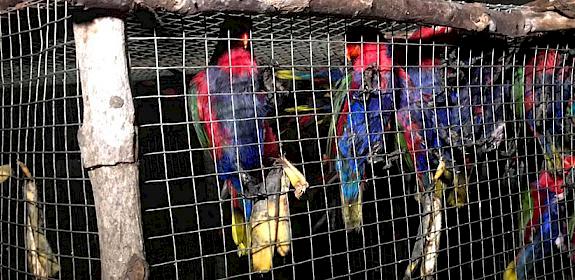Viet Nam provides rhino horn samples to South Africa for DNA testing
Hanoi, Viet Nam, 12th July 2017—Following a record number of rhino horn seizures in Viet Nam in the first half of 2017, national authorities have provided samples for further intelligence gathering through advanced DNA testing in South Africa.
A total of 41 samples from rhino horns seized in Viet Nam in the first half of 2017 have been DNA-tested by Vietnamese authorities and were this week handed over to their South African counterparts for further forensic investigation.
The origin of the rhino horn will be determined by comparing it to samples registered within the South African managed RhODIS® (Rhino DNA Index System), to gain further insights into the illegal trade routes and criminal networks behind the trafficking.
RhODIS® is a rhino DNA profiling and database system developed by the Veterinary Genetics Laboratory of the University of Pretoria and partners. As of last year, all but one of Africa’s rhino range States had contributed samples to the VGL for RhODIS® analysis.
Associate Professor Nguyen Van Sinh, Director of the Institute of Ecology and Biological Resources of Viet Nam CITES Scientific Authority said: “DNA testing helps to identify the correct species of illegally traded animals and plants. Sometimes it is hard to identify the species based on morphological features, particularly when the specimen is not wholly intact or is a separated part of the animal or plant, or the specimen is fake. In addition, sending specimens for testing at international labs will help verify the geographic origin of the specimen. These data will support management and law enforcement agencies to come up with better methods to control each part of the illegal wildlife trade network.”
TRAFFIC continues to offer support to the Vietnamese Government to assist in forensic testing and build capacity of law enforcement officers. The knowledge, technical expertise and resources from TRAFFIC and other NGOs working to counter wildlife crime can provide practical assistance for the Vietnamese authorities to tackle the trafficking menace
Madelon Willemsen, head of TRAFFIC’s Viet Nam office
TRAFFIC, together with both the Management and Scientific Authorities responsible for Viet Nam’s compliance with the Convention on International Trade in Endangered Species of Wild Fauna and Flora (CITES), has been working to support the consistent testing of confiscated rhino horn.
This latest collaboration demonstrates Viet Nam’s commitment to engage with a key range country in combating the trade of rhino horn.
The rhino horn samples were formally handed over to a delegation from the CITES Management Authority of South Africa during a bilateral meeting on strengthening the implementation of the Memorandum of Understanding and Action Plan on co-operation in biodiversity conservation and protection between Viet Nam and South Africa.
Despite the increasing number of confiscations of trafficked wildlife products by Viet Nam’s authorities in recent times, prosecution rates and the level of penalties (mostly administrative fines) remain too low to deter wildlife criminals. The long awaited new Penal Code, approved on 20th June 2017 and set to come into force from 1st January 2018, should increase the risk to criminals through raising the penalties for engaging in wildlife crimes.
This year, authorities in Viet Nam have seized more than 150 kg of rhino horn in eight seizures, five of them made by Vietnamese Customs officials at two of the country’s international airports.
On 14th March two suitcases containing over 100 kg of rhino horn were confiscated at Noi Bai International Airport in Hanoi, arriving from Malawi (via Kenya), while a further 3 kg were seized there from the personal luggage of a suspect arriving from Myanmar on 22nd April.
At Ho Chi Minh City’s Tan Son Nhat Airport three seizures, totalling 10.5 kg of rhino horn took place on 16th April, 8th May and 14th June, all concealed in luggage on flights from undisclosed countries in Africa. A number of suspects remain in custody with their cases still under investigation.
Further seizures took place in Hoang Mai District, Hanoi, on 27th May, when 18 pieces of rhino horn weighing 3 kg in total were seized from a suspect’s house. He later claimed he had been paid by two strangers to keep the horns.
Also in Hanoi, three men were apprehended carrying 33 kg of rhino horn near Ha Noi’s central railway station on 27th April. The residence of one of the men was searched later the same day and an additional 3 kg of rhino horn, two frozen tiger cubs, four lion pelts and many pieces of ivory were found. The owner of the house is in detention while further investigations continue.
The other suspects claimed they were trafficking wildlife products from African range States via flights into Malaysia, Thailand and Cambodia and then traveling to Viet Nam by ship or train to avoid detection.
Outside of Viet Nam, a Vietnamese national is currently awaiting trial in South Africa after he was arrested attempting to smuggle 28.7 kg of rhino horn onto a flight from South Africa’s OR Tambo International Airport on 15th June.
“There is an urgent need to understand the trafficking routes so that law enforcement action can be effectively directed at key points along the entire illegal trade chain,” said Willemsen.





